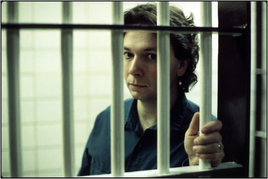|
In my last blog, I mentioned how often inmates struggle with forgiving themselves for their failures as a parent. Many times they do not want their child to come visit them while they are in their prison garb sitting on the other side of a divided table. Of all the painful consequences of committing crime, the damage to the family may be the worst of all. I have seen families stay united, strong, and understanding during a parent’s incarceration but most often the separation causes long term difficulties for the spouse and children.
Once when I was doing a devotional reading, I was surprised to discover that the prophet Samuel had his own parenting troubles. It seemed that his sons did not follow in his God-honoring ways and when they were given some authority they used it to cheat the people and pervert the truth. It may have been that Samuel was rarely home as he traveled around judging the nation of Israel. Perhaps he had not been there at key points in his son’s lives when they needed affirmation and a clear role model. As someone who pastored a church for 22 years, I remember how many events in my kid’s lives that I missed because of the responsibilities of the ministry “call”. I was noticeably absent from some of the photos just like that parent who is serving their time in prison. So there is lots of parental guilt to go around whether you are in prison or being the typical way-too-busy mom or dad. Most parents I have known, including myself, have made mistakes. The hope is that first we can get forgiveness from God for our failures and experience His cleansing from the guilt (1 John 1:9). Then our prayer should be for our hearts to be turned towards our children in a fresh way and for God to turn their hearts towards us (Malachi 4:6). After that we need to rebuild godly loving relationships one step at a time. I’ve seen ex-prisoners do it with their families so I know that it is possible for others with God’s help.
0 Comments
Quite often someone tells me that they have no problem believing that God is willing and has actually forgiven them. The problem is that they cannot forgive themselves for what they have said or done. This sent me on a study in the Scriptures to find the Bible portion about forgiving yourself. There are many references to our need of confessing and seeking God for forgiveness (1 John 1:9). There are also many places where the importance of forgiving others is stressed as in the prayer the Lord taught His disciples, “forgive us…as we forgive those that trespass against us” (Matthew 6:12). But nowhere can you find a Bible lesson on how to forgive yourself.
This presents quite a challenge to some believers as they struggle to get past the guilt of something that they did especially to a loved one. In the prison setting I often find inmates that cannot forgive themselves for the damage their crimes have caused in the lives of their spouses, children or parents. No matter how many times they are assured that God has forgiven them they just cannot let go of the overwhelming remorse concerning their failure as a parent, spouse, or adult child. Even though there isn’t a specific Biblical portion about self-forgiveness, God does know that we need it. I believe that is why it says in 1 John 1:9, “…He is faithful and just to forgive us our sins and to cleanse us from all unrighteousness.” I believe that “unrighteousness” covers that awful feeling of guilt and remorse. David said, “Deliver me from bloodguiltiness” (Psalm 51:14) expressing the weight of his regret and sorrow over what he had done. God has given us the remedy for self-forgiveness by providing such a thorough forgiveness and cleansing when we fully confess our sin and guilt to Him. As He grants us forgiveness and restores our relationship with Him, we should embrace His cleansing to heal our guilty souls. One of the greatest promises from God is that He will not remember our sins. Can you imagine what it would be like if He kept every one of our sins in mind? “Oh, there’s that Carter kid again…you know he willfully disobeyed his grandmother when he was only five…he cheated on a history test in fifth grade…he stole a ‘Hot-Rod’ magazine from the pharmacy when he was fourteen…and you can’t imagine how many times he broke the speed limit once he got his driver’s license…and let me tell you what he did as an adult!” God certainly is capable of remembering every sinful thing that we have ever done, but He made a divine decision to put every forgiven sin “as far as the east is from the west” (Psalms 103 12). God wants us to know that we can approach Him knowing that He has removed our confessed sin to a place where it is forgotten and is giving us a fresh start in our relationship with Him.
Human beings, on the other hand, aren’t so good at forgetting or at least not identifying someone with their worst behavior. I wonder how long it took before people stopped saying “Rahab – the harlot” or Mary Magdalene of always being attached to prostitution. Did Thomas finally become “The Apostle Thomas” and not “doubting Thomas” at some point in his ministry career? And I can think of many others for this list who, like the woman at the well, was forgiven of her sin by God but perhaps still identified with them by her neighbors. It has been over a year since the Lord took Chuck Colson home. As I read the news articles concerning his death, every one focused on “Watergate felon” Chuck Colson. It was like the last thirty plus years of selfless ministry never happened. Christ will straighten that out as He rewards Chuck for his service, but I want to try harder not to identify my fellow believers according to their worst decisions or behaviors. If God gives fresh starts, I think that I should as well. Unfortunately, it is not unusual for me to visit with someone at the county jail who has been re-incarcerated for a second, third or more times. Often the offenses are small, seemingly foolish, like failing to show up for a required probation or drug court meeting. If they had simply arrived on time at a scheduled meeting they could continue to enjoy their summer instead of spending it behind the bars and concrete block walls of the jail. They have many persuasive reasons for missing the meetings but the bottom line comes down to just following the rules that they so mightily struggle to keep. Human beings have certainly shown their difficulty with obeying those in authority since Adam and Eve failed to keep God’s rule about picking the forbidden fruit of the Tree of Knowledge.
The heartbreak for me is seeing the increasingly serious consequences that these individuals experience. For being lazy, inconsiderate, forgetful, or passive-resistive towards authority, someone can end up serving serious time in a state facility. Because of their nonchalant attitude toward keeping the rules their punishment grows exponentially greater from a few months to a county year to several years in state prison. Often the crime they are in jail for this time may be petty, but their entire history of behavior is considered when sentencing arrives. A consistent rule breaker will find less and less mercy available from the court. Solomon wrote extensively about the choices of foolish human beings in Proverbs. He contrasts that foolish behavior with the choices of those that have learned to listen and obey. One thing becomes abundantly clear – the longer we resist doing the right things in life the more difficult our lives will become. Being imprisoned is a hard lesson. But for every person the truth is that we need to obey God quickly before we reap the difficult consequences of our defiance. Quite often when visiting with an inmate at a county jail, they tell me I am the only person meeting with them. The truth is that their months or years of active addiction, lying, stealing, and other abuse towards their loved ones have burnt the bridges of family relations. It is understandable that the families have come to the end of their patience and have decided to distance themselves from their troubled son or daughter in a form of “tough love.”
I’ve certainly heard the terminology of “tough love” tossed around quite a bit in the prison ministry setting. As I look in the scriptures to find a Biblical example of tough love I can certainly find stories where individuals or nations have been the recipients of God’s form of tough love. You don’t have to look further than the book of Judges where God’s people, Israel, continuous break His heart and force Him to allow them to experience life without His provision and protection. Their horrendous behavior became a continuous warning for the church in the New Testament (1 Corinthians 10, Hebrews 3 & 4, etc) as well. But the important thing that I see is that throughout their rebellious behavior God never entirely abandons them. He is always looking for their return like the father of the prodigal son (Luke 15:20). Suspecting that his father would at least give him a chance to be a servant in the house contributed to the prodigal’s repentance and return. I realize that sometimes families have had to take out “orders of protection” against their incarcerated loved ones and they have to stay obedient to the law. But when inmates show evidence of committing their lives to God, I would hope that families would give them opportunity for reconciliation. I know that it is hard, boundaries will need to be set, and a plan for rebuilding relations established. I pray that “tough love” can give way to healthy family and godly love once more. Recently I was listening to a eulogy for a military leader who had lost his life while commanding his troops during a battle with enemy insurgents. His fellow soldiers commended him for being a commander “that led from the front” instead of directing a battle safely behind the front lines of combat. I think that describes the difference Paul is referring to between being an instructor and being a father. An instructor can tell you how to do something, but a father is there to show you how it is done. Being an instructor is pretty safe because you can always say that something didn’t work for the one being trained because they just didn’t understand what you meant. However, when you are demonstrating what should be done while working with the trainee, they get to see you while you succeed and when you struggle or fail. Sometimes that can bring embarrassment.
But regardless of the possibility of less than perfect outcomes, the Apostle Paul risked saying, “…imitate me.” I’ve talked to some young married men who are thinking about never becoming a father. They say that they are worried about what kind of world their children would be born into, but I think that they are also judging their capabilities of wisely helping to navigate their children through that challenging world. Considering the world that we are living in, I can’t help but feel that we need more spiritual fathers than ever before – godly men who will “lead from the front.” We need men that are being taught and led by their heavenly Father (2 Corinthians 6:18). These men would be following the Biblical example of godly character and self-sacrifice given by Jesus Christ (1 Peter 2:21). We need men who will risk saying, “…imitate me” as I follow the Lord. |






 RSS Feed
RSS Feed